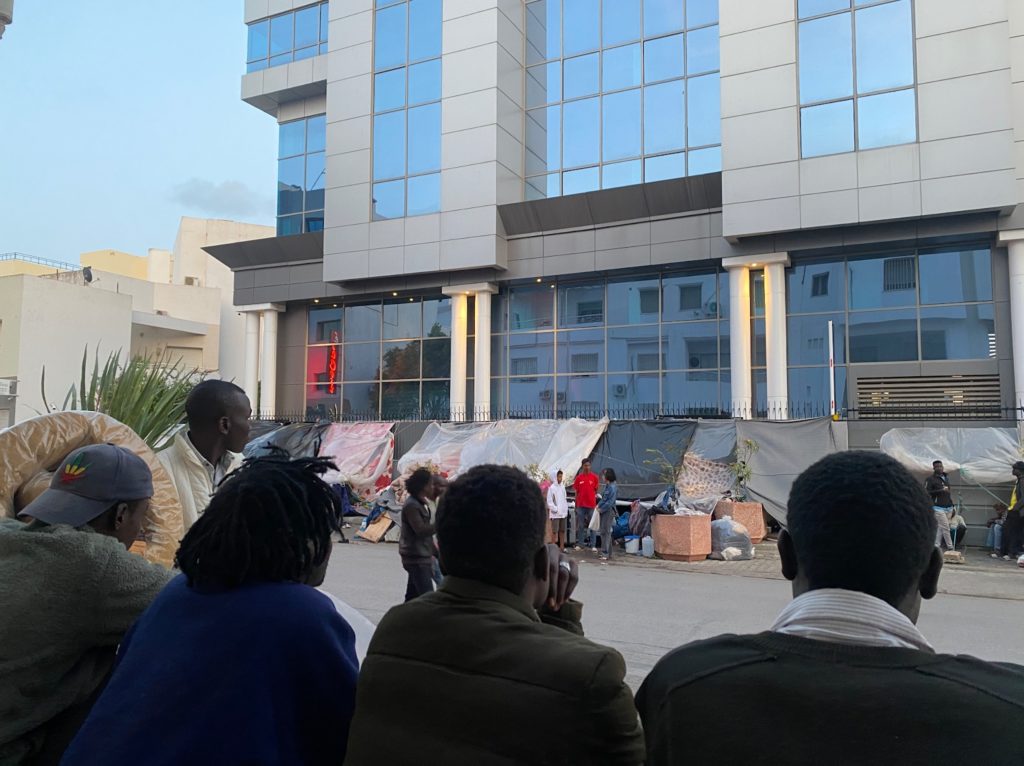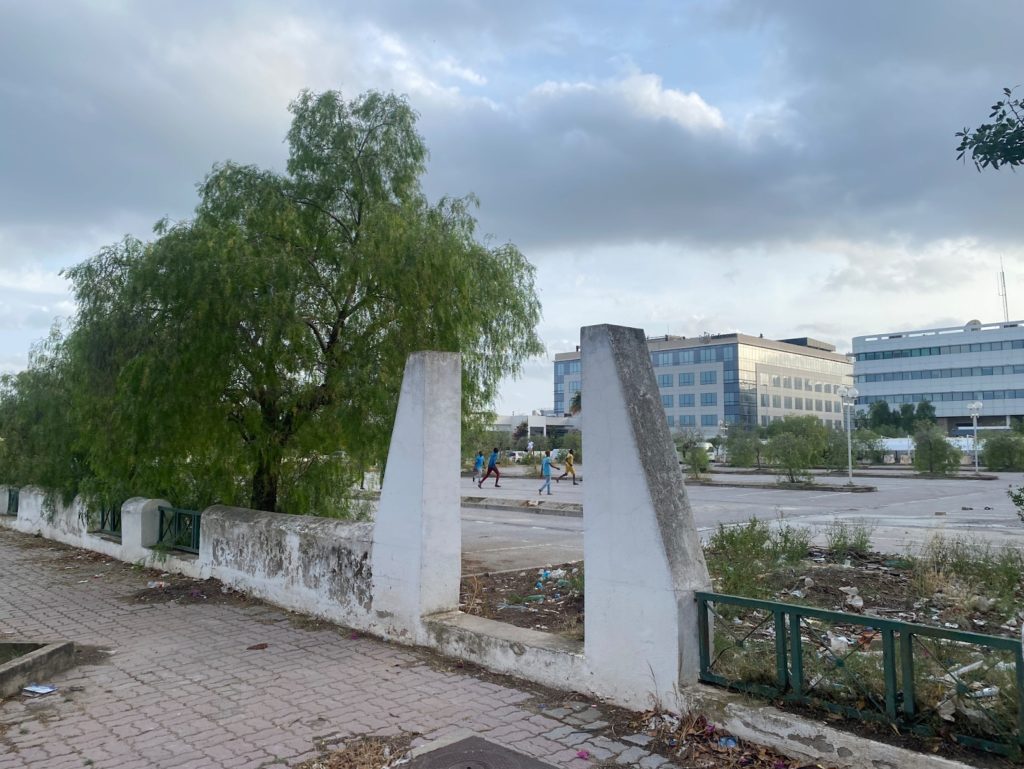Part Two
In the wake of Mohammed Faraj Momin’s death, protesters gather in silence, but they are in urgent need of hearing.
Next week, they will speak to Melting Pot at a press conference.
Mohammed Faraj Momin1 lost his life on Wednesday, May 25, at Charles Nicolle Hospital in Tunis.
Mohammed was a member of a Tuareg tribe, a nomadic population present in the territory of several Saharan states. This population, whose presence predates the 7th century, is stateless, a condition that – in Tunisia – hinders the recognition of rights and the access to citizenship.
He was part of the 269 refugees and asylum seekers who, for the last four months, have been permanently occupying the streets in front of the offices of the United Nations High Commissioner for Refugees (UNHCR) in Tunis. Indeed, starting from the 29th April, 55 protesters from Tunis joined the 214 who began the sit-in in Zarzis. According to the protesters, UNHCR has purportedly emphasized the distinction between the two groups to discriminate in the distribution of services, such as medical care. Doctors of the World, the association in charge of providing basic medical aid, is reported to be in possession of a list of those to assist, containing only the names of the first 214 protesters. However, despite differences, all protesters demand evacuation from a country that leaves them in life-threatening conditions.
The obstacles to regularization in Tunisia
Despite being one of the EU’s strategic partners in border externalization policies, Tunis lacks organic migration and asylum legislation. This means that, while being a signatory of international laws on protection and asylum, it cannot implement them. In such a legislative void, the responsibility for determining and implementing the right of asylum is of UNHCR.
Looking for asylum in Tunisia was the last resort for many Tuareg. Staying in Libya as a stateless person had somehow been possible for Ridha until the outbreak of civil war: “If there hadn’t been the war, I could adapt to living without nationality in Libya. It was the war that forced us to leave, the violence of the bullets that destroyed our village. We had to flee to Tripoli, and from Tripoli to Tunis in 2019.”

After entering Tunisia fleeing war and persecution, the protesters had to face the negligence of the UN agency. There is no concrete solution on the horizon – although UNHCR promised to get the protesters off the streets on May 23, after having previously evicted some of them from residences due to “lack of funds” in February.
No investigation into the circumstances of the accident, no death certificate
During the last week of his life, Mohammed Faraj Momin had been in a coma, following a car accident at the sit-in. A car had run him over on May 19th. One of our Tuareg informants told us that the driver was drunk at the time of the investment. Although Mohammed’s family tried to file a complaint to clarify the circumstances of the accident, they did not receive any feedback from law enforcement agencies.
A Tuareg father at the sit-in reports: “They would not give us a copy of his medical records or the death certificate. They promised us they would bring them to the burial, but they showed up empty-handed. We want to know how our brother died, instead they act as if he was a small animal to die.”
He continues, “It’s the same thing that happened to one of my twins last year. When he was only one month old, he got sick, so we took him to the hospital. We were told that it was a simple cold, but for four days they wouldn’t let us see Yasin. When they gave him back to me, the baby was swollen like a balloon. He died after a few days. It took me 10 months to convince UNHCR to give me his medical records and the death certificate.”
No rights neither in life nor in death for African people on the move in Tunisia. No one seems to be upset in Europe, when dozens of shipwrecked bodies recovered at sea spend weeks in the morgue corridors of Tunisian port cities, awaiting DNA testing. While doors are thrown wide open to “real refugees” from Ukraine’s “real war”, refugees from African wars remain excluded from legal migration routes into the EU.
The social invisibility of refugee people in Tunisia
All Africans on the move are exposed in Tunisia to a form of systemic racism that excludes them from access to social rights, especially education, employment, and healthcare. To receive public medical care, for example, even those with refugee cards must pay a ticket for which they can only later seek reimbursement from UNHCR. Victims of wage discrimination, dependent on a meager and uncertain economic contribution, they often find themselves having to choose between medicine and food.
Discrimination also affects education. Abdul, one of the leaders of the protests, tells us that he pulled his kids out of school to protect them from the racist attacks they suffered every day in Sfax. And he is not the only one. Abdelrazzak recounts, “I enrolled my children in school, with my own effort and thanks to neighbors. But then the Tunisian Refugee Council (CTR) – one of UNHCR’s local partners – came and prevented the children from continuing to study in that school, claiming that it was illegal.”

Dozens of testimonies document the severe wage discrimination: “For the same job in a factory, a Tunisian gets 1400 dinars a month. We get 400 instead, and what’s more, without any contractual protection.” Jamila, a very young Guinean refugee who fled sexual violence and arranged marriage, says that for about 8 hours a day of work at a restaurant in the medina (old town) of Tunis, she receives just 15 dinars: a little more than 60 cents of euro per-hour. Relocation is not on the horizon for her either: “At least working helps me take my mind off my situation.”
The Tunisian limbo: hell for some, profit for others
Institutional racism is one of the pillars holding up the international system of migration apartheid. But the persistence of this system is rooted in important as well as illicit economic reasons. These reasons tie together the interests of mafias, national and international institutions.
For the protesters, any compromise solution proposed by the agency would be perceived as stalemate. Therefore, they are determined to reject even the proposal of accommodation in new shelters. They fear that this is a strategy by UNHCR to isolate them and leave their requests for resettlement to safe countries unanswered.
The incompetence and corruption of the U.N. Agency’s partners in Tunisia are summed up by Bob, one of our Sudanese informants: “The malfunctioning services they give us allows them to buy expensive cars and live the good life. I think as a UN institution, UNHCR has the funds to allow refugees to live well. But the money disappears in the hands of local partners: the Tunisian Council for Refugees (CTR), in charge of asylum procedures; the Tunisian Association for Management and Social Stability (TAMMS), in charge of employment; and the Arab Institute for Human Rights (IADH), in charge of legal protection. I think that if these partners were not there, things would be better for us. But as long as the management of our lives is in their hands, our lives will be turned upside down. Just like now.”
These refugees’ situation of limbo in Tunisia goes on unabated, even after Mohammed’s death. Rights in life are lacking, as much as rights in death. Despite the difficulties, the resistance continues – until documents and certificates regarding Mohammed’s accident and death are handed over, the burial will not take place. And until their demands are met, protesters will continue to garrison Rue du Lac in Tunis.
UPDATE: After the delivery of documents, the funeral finally took place on Wednesday, June 1. Mohammed’s body rests in peace, his memory lives on as a reminder for a continued quest for justice.
(to be continued)




